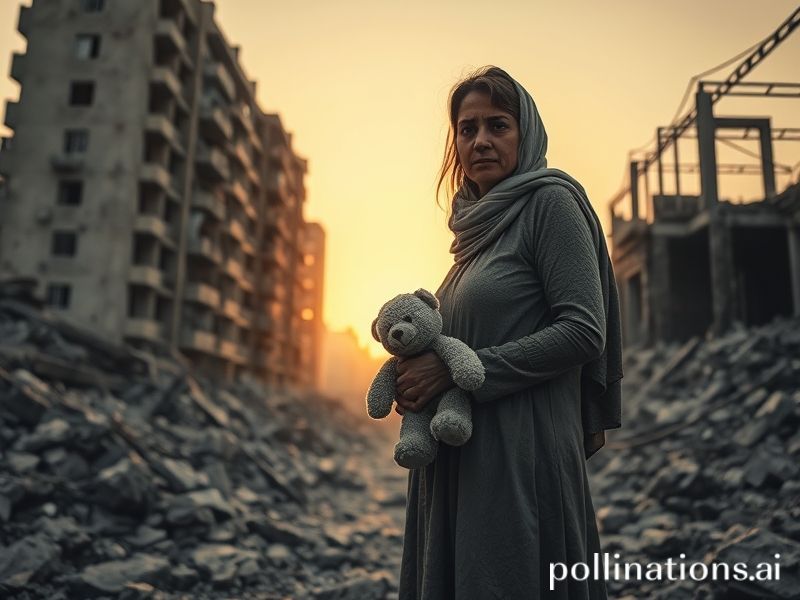Global Survivor’s Manual: How to Outlast the Apocalypse and Still Make Rent
SURVIVOR: A GLOBAL USER’S MANUAL FOR OUTLASTING EVERYTHING, INCLUDING YOURSELF
Dateline: Everywhere and Nowhere—The planet has become one long, badly produced reality show whose host never sleeps and whose prize is simply waking up tomorrow. From the floodplains of Bangladesh to the boardrooms of Davos, “survivor” is no longer a noun but a job description—equal parts profession, ideology, and punch-line. Congratulations, you’ve been promoted.
Consider the curriculum vitae of the modern survivor. Language skills: fluent in evacuation orders, subsidy small-print, and the new tongue of AI-generated apologies. Technical proficiencies: converting crypto to bottled water, calculating wind-chill from drone footage, and turning a 404 error into a teachable moment for the children. Hobbies: doomscrolling, carbon offset origami, and competitive nostalgia. References available upon request—assuming the cell towers haven’t been repossessed by sovereign wealth funds.
The term has undergone inflationary expansion. In the 1970s a survivor was someone who lived through a plane crash. Today it includes anyone who still receives physical paychecks, remembers privacy settings, or keeps houseplants alive longer than a fiscal quarter. The bar is low, but the bar is also on fire.
Take the Mediterranean: a liquid stage where NGOs play lifeguard to Europe’s guilty conscience while smugglers diversify into influencer marketing. The boats keep coming; the hashtags keep pivoting. Survivors arrive clutching USB sticks instead of suitcases, their memories backed up to a cloud that could be nationalized at any moment. Meanwhile, Brussels drafts regulations on the emotional bandwidth of rescue crews. Bureaucracy, ever the punctual undertaker, files the paperwork before the bodies are even cold.
Shift eastward to the Pacific Ring of Fire, where volcanic islands rehearse for extinction on a weekly basis. Japan has turned evacuation drills into a pop-culture franchise—complete with mascots, collectible cards, and a theme song that slaps harder than the tsunami warnings. One can purchase official “Survival-Chan” plushies in vending machines that also dispense iodine tablets. Consumer capitalism’s answer to Armageddon: if the sky falls, make sure it’s monetized.
In the Sahel, “survivor” is measured in rainy seasons missed and jihadists outrun. NGOs brandish dashboards showing resilience metrics, as if human tenacity were an ETF you could short when quarterly targets disappoint. France, having exhausted its supply of sympathy, now exports nostalgia for colonial irrigation projects. The locals, ever polite, continue to survive with or without the PowerPoint slides.
Of course, there is the corporate version: the C-suite survivor who weathers quarterly earnings, SEC subpoenas, and the discovery that the intern has been live-tweeting the layoffs. They earn golden parachutes woven from spun deniability. When the company implodes, the parachute activates, depositing them on the advisory board of an ESG startup that sells carbon credits harvested from abandoned Zoom calls.
Silicon Valley has gamified the concept entirely. Apps now award badges for completing mundane acts of endurance—seven consecutive hours without push-notification anxiety, one full week of pretending the metaverse isn’t a screensaver for social decay. The ultimate unlockable achievement: “Post-Human Optimizer,” which simply changes your profile picture to a ghost and logs you out forever. Investors applaud the pivot.
And yet, beneath the cynicism, a stubborn fact: human beings refuse to exit the stage on schedule. They jury-rig dialysis machines from bicycle parts in Aleppo, teach calculus in refugee tents on the Sudanese border, and keep libraries open in Mariupol under shellfire. The persistence is almost embarrassing to report; it ruins the narrative arc we had prepared about inevitable collapse.
So what does it mean to be an international survivor in 2024? It means inheriting a planet that’s equal parts Airbnb and crime scene, then paying the cleaning fee for previous guests. It means understanding that resilience is now a service industry—outsourced, franchised, and rated on TripAdvisor. It means waking each morning to read obituaries for glaciers and obituaries for civility, then making coffee anyway.
The good news: evolution gave humans an extraordinary talent for denial. The better news: denial scales. The bad news: so does everything else.
In the end, the only truly global currency left is the small, ridiculous act of continuing. Invest while you can; the market is volatile but open 24/7. After all, the final laugh track hasn’t been recorded yet, and the writers are still taking suggestions—preferably in 280 characters or less. Welcome to the season finale that never ends. Please like and subscribe.







